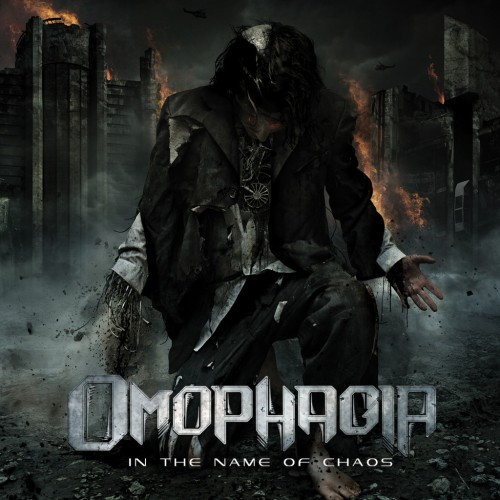(DGR delivers a two-fer… reviewing the new albums by California’s The Zenith Passage and Omophagia from Zurich.)
If you’re a fan of the modern tech-death scene — the one in which tech-death has evolved into its own shorthand moniker to represent an entire genre as opposed to just a way to describe complicated death metal — then last week should have proved to be pretty big for you, as Unique Leader had two releases hitting right in the same window.
The label, which has specialized in a brand of tech-death that is equal parts technical and groove-focused, has spread out quite a bit in the past few years and has become increasingly prolific, to the point where they’ve actually developed something of their own sound. You could say, “Unique Leader tech-death” to some people, and they would have a pretty good starting point as to whatever bands you’d be describing at that moment. While the label has always delved heavily into the California scene (at one point seeming like they were sweeping through the Bay-Area-to-Sacramento run especially), recent years have also seen the label adding quite a few international acts to the mix — which brings us to this point.
Last week brought two fairly big Unique Leader releases, one of which is the first full-length release for So-Cal-based The Zenith Passage and the other the second album (after a five-year wait) for Swiss death metal proprietors Omophagia. As such, I felt it might be interesting to slam the two albums into one big review package, because both of them by their nature feel like two takes on the same subject — two differing styles of death metal but with one very solid throughline between them.

Photo by Robert Bejil Productions
THE ZENITH PASSAGE: “SOLIPSIST”
The idea of a tentpole band is one that I’ve found myself dwelling on quite a bit when it comes to Unique Leader releases. Usually, when a label specializes in a specific brand of genre-fare, it often feels like they have a few bands who become the ones around which said label is centered, and more often than not, seem to influence quite a few of the releases that come afterward; they help define the sound the label is looking for, and it often feels like a few follow-on CDs tend to be in a similar vein. Arkaik and Deeds Of Flesh are two such bands for Unique Leader — which, given the history of shared musicians between the projects, makes sense — and their brand of groove-heavy tech-death has likewise defined much of their label’s discography over the years. Judging by The Zenith Passage’s first full length release, Solipsist, I could easily see them becoming the third group to come to mind immediately.
There’s an old axiom about how you’ll never go broke playing to the cheap seats, and it comes to mind when going through a few spins of Solipsist. There are so many recognizabe elements from the tech-death genre that if you’ve been following it for a while you can’t help but be pleased by the keys being jangled in front of you. Solipsist is a goddamned shiny and groove-heavy record, with a variety of different sounds all being fused into one another in order to create a philosophy-heavy concept album. It is a great-sounding, almost perfect summation of the modern tech-death scene, a sort of amorphous blob that has absorbed so many influences and elements and then refashioned them into their own personal machine. It’s hard not to listen to Solipsist and find yourself recognizing different elements and where they came from. The militaristic and punchy percussion element that seems like a bullet-point for many Unique Leader releases is present in full force, the blast battery deployed at a moment’s notice, complete with a thick and hefty bass drum that sounds like a depth charge when it takes a full solid hit.
Comparisons to The Faceless are also likely going to be pretty hard to avoid when spinning The Zenith Passage’s new one, and partially that is by design. Both Michael Keene and Wes Hauch have done some work on Solipsist (although it’s easy to pick out the Zack Ohren engineering job present on this album), and guitarist Justin McKinney wound up joining the group for its current incarnation. Needless to say, that band’s DNA runs deep in The Zenith Passage, and the latter band, to their credit, make a pretty solid attempt to differentiate themselves. They’re more heavily groove-focused and aren’t shy about breaking out a few hefty, traditional, grinding death riffs on top of the usual rhythmic batterings that the guitars usually inflict on these types of releases. On top of that, they’re a little punchier on the tempo front, and songs like “Deus Deceptor” easily demonstrate why it was one of the first released from Solipsist, because it has one of the catchiest guitar parts on this album.
Tech-death releases can often feel like the groups are trying too hard to portray themselves as being high-minded, and The Zenith Passage perform a delicate dance to put some force behind their words. Solipsism is a philosphical school of thought and one that loans itself well to the underlying themes of this album — in one case, the right-up-in-your-face theme of “Metaphysical Solipsism”, which despite being a word mouthful is actually an interesting song filled with start/stop mechanisms and buzzing leads that spill right into its following sibling “The Tenebrous Veil”. The section in “Metaphysical Solipsism” that is about ten seconds or so of just drummer and vocalist is patricularly fun. “Tenebrous Veil” has a fun opening chug section and an equally catchy vocal line that is as rapid-fire as they come.
Solipsist isn’t going to be the sort of album that absolutely blows minds, but it is consistently good-to-great all the way through. The musicianship present here remains stunning, but at a caliber that we’ve seen become the new standard, with groups like The Zenith Passage being partially responsible. It is in part an album where the much-maligned “For Fans Of” sticker would be almost scarily accurate. I could easily recommend The Zenith Passage to any tech-death fan and they would draw enjoyment from it.
It’s been a red-meat release for me. I know that if I want this style of music, The Zenith Passage have that ground covered pretty well, from the occasional synth work down to the rhythm section almost defining the band at times. They have some punchy and catchy songs up their sleeve, and at forty minutes, Solpsist has made for a good quick listen every now and then. It’s got its fair share of stock grooves, but the band do tie them together in fairly interesting ways, often with a keyboard solo or a pretty wicked high shriek that is almost criminally underused.
Listening to Solipsist, you can easily hear all the hallmarks of the current tech-death sound, but this is the sort of release that has just enough of everything to be pleasing and the type of album that could easily vault The Zenith Passage into becoming one of those tentpole bands, because they already have so many of those defining sounds down pat.
Solipsist is out now and you can order it on CD or vinyl HERE, or via Bandcamp:
https://uniqueleaderrecords.bandcamp.com/album/solipsist
https://www.facebook.com/TheZenithPassage/
OMOPHAGIA: “IN THE NAME OF CHAOS”
Swiss Death Metallers Omophagia, on the other hand, are the more traditional death metal release of the two — albeit with their own particular and delightfully twisted spin on the formula. You might recognize these gentlemen from a video premiere for the song Down We Fall that happened on this very site, in case you’re curious as to why Omophagia might’ve landed on our radar. In The Name Of Chaos marks Omophagia’s second release, coming in at about five years after their debut record Guilt By Nescience.
In comparison to compatriots The Zenith Passage, Omophagia are a little bit more straightforward, and judging by the song titles present on the album, a little less philosphically minded and a little more blunt. Admittedly, you kind of have to know what you’re in for when you purchase a death metal album that has a track called “Love Song” on it, and you can’t be too surprised when it turns out to be anything but. That’s about as subtle as Omophagia get; In The Name Of Chaos sees the band laying all of their cards out on the table.
The first track is dutifully named “Intro”, and that should be as good a signal as any that you’re in for a different ride than the album above. Gone are the always impressive and mind-bending tech-death noodling and meditations on the state of the universe and all of its holographic principles, replaced by an album cover that seems to consist of a man with a city behind him on fire and an opening track that is actually the second time Omophagia have named the first song on an album “Intro”. After that, the band have a little fun with alliteration in both “Willing Whore” and “Man Machine”, but most of the songs on In The Name Of Chaos don’t pass more than five words in length. Omophagia are more about surgical and hyperspeed brutality than they are progressive song structures and ruminations on the universe. Instead, we get the focus laid on death and acts thereof.
Despite the disappearance of lead guitar noodling, Omophagia are more than happy to deliver a smattering of maddening riffs and angular guitar structures that seem to come from all angles. In some ways, it’s like being assaulted in a dark room — you don’t know which direction the fist came from, but the feeling of being punched in the face is awfully familiar. Omophagia show no fear in breaking out a couple of hyper-complicated guitar solos, but they are few and far between, punctuating movements on In The Name Of Chaos — in an album that’s heavy on the blast-beats and finger exercise rhythms.
Omophagia are equally percussive and guitar-driven on In The Name Of Chaos; at times it feels like the group have decided that they need to follow the blast-beat sections being delivered by the drums, and other times the drum parts seem to be written by the guitar — consisting of fast-tempo chugs tailor-made for headbanging. “The Dominant” in particular is a song that feels like an excellent melding of the different directions Omophagia take into one fantastic song with an intense mid-section.
Omophagia do make one thing very clear from the outset, though, and that is that despite the whirring machinations of the guitars and the hefty yells, Omophagia have a bassist, and holy hell does he get his due across this disc. Although there aren’t many segments in which you hear the band with a lead bassist, it feels like every part on this album is followed by a jangling low end where you can practically feel the strings vibrating through the speakers. There are so many pops and quick little hits within each song that they almost punctuate each drum hit.
In The Name Of Chaos displays no delusions of grandeur and instead feels more like a sharpened strike. Omophagia are a quick-moving band with a sleek writing style and a mix that is kind to the low end. Sections of In The Name Of Chaos are hyper-complicated and could easily appeal to people who love Soreption, and at other times Omophagia are just a rhythmic and pounding yell — like the closer “Instrumentalized”, which is pretty much as it sounds: a big, closing instrumental that at times boils down into a gigantic breakdown, just another huge section to be stacked upon the corpse pile that is In The Name Of Chaos.
It’s not the headiest release out there by a mile, but Omophagia aren’t caveman stupid either. They just happen to practice a branch of death metal that is gnarled and shoots off in a mliion different directions, and also happens to grow at a million miles an hour. In The Name Of Chaos is a high-speed release that covers a ton of ground almost breathlessly, and does so in a joyously demented fashion.
The album can be ordered on CD or vinyl HERE, and it’s also on Bandcamp:
https://uniqueleaderrecords.bandcamp.com/album/in-the-name-of-chaos
https://www.facebook.com/Omophagia/




Damn the Omophagia album is brutal.
Zenith Passage sounds wierd in the right kind of way.